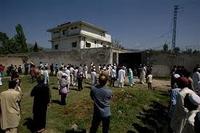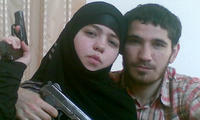-
Al Qaeda cellphone shows possible link to Pakistani Intelligence

The latest details to emerge from the data seized by Navy SEALs from the raid that killed Osama bin Laden reveal that al Qaeda may have links to a Pakistani militant group that has close ties to Pakistan’s intelligence agency; analysts found that the cell phone of Osama bin Laden’s courier contained contacts to Harakat-ul-Mujahedeen, a militant group originally set up with the assistance of Pakistan’s Directorate for Interservices Intelligence (ISI) to fight as a proxy in Afghanistan
-
-
Marine reservist arrested outside Pentagon, suspicious vehicle found

Authorities apprehended Lance Corporal Yonathan Melaku early Friday morning after he was found at Arlington National Cemetery while it was still closed; authorities discovered that the suspect was carrying a notebook that contained the phrases “al Qaeda,” “Taliban rules,” and “Mujahid defeated croatian forces”; law enforcement officials say that despite the evidence found, Melaku is not believed to be involved in a terrorist plot
-
-
Al Qaeda posts hit list of Americans online
Terrorists on al Qaeda web forum have posted a hit list of prominent politicians, military officials, and individuals in what government officials fear is an attempt to spur lone wolf attacks; on Ansar al-Mujahideen, an al Qaeda run website that is among the top ten outlets for distributing jihadi propaganda, terrorists posted a list that contains the names of Pentagon officials, defense contractors, Congressional members, and private individuals
-
-
Pakistan charges 5 with helping U.S. kill OBL
Pakistan arrested five men and charged them with leaking information relating to the 2 May killing of Osama bin Laden; no, they were not accused of being informants for al Qaeda or the Taliban; rather, they are charged with secretly providing information to the united States — information which led to the successful operation; among the detainees are the Pakistani who rented and maintained to safe house in Abbottabad , from which CIA operatives kept an eye on bin Laden’ compound, and a Pakistani Army major who is credited with photographing the license plate of the car of bin Laden trusted couriers; following the courier’s car was the key to locating bin Laden’s hideout; deputy CIA director, when asked to rate Pakistan’s cooperation with the United States in fighting terrorism, replied: “Three”
-
-
Intelligence agencies get an inside look at al Qaeda

As analysts pour through the files confiscated from Osama bin Laden’s compound, U.S. intelligence agencies are gaining valuable insights into al Qaeda’s operations and plans as well as how they think and operate; during the raid that killed bin Laden, Navy SEALs managed to take bin Laden’s handwritten journal, five computers, ten hard drives, and 110 thumb drives; so far cyber experts and translators are “95 percent done” with decrypting and translating the confiscated information
-
-
DHS reduces monitoring of non-Islamic domestic terrorism

In May 2009, DHS issues a report saying that the recession and Obama’s election could lead to a “violent radicalization” of extremist groups in the United States; conservative politicians and commentators charged that the report was an attack on conservative ideology and groups opposing abortion and immigration; in response, DHS has eviscerated the analytical unit which issued the report, cut the number of personnel studying domestic terrorism unrelated to Islam, canceled state and local law enforcement briefings, held up dissemination of nearly a dozen reports on extremist groups, and has blocked the dissemination of a digest of domestic terror incidents and the distribution of definitions for terms such as “white supremacist” and “Christian Identity”; state and local law enforcement and security experts are worried
-
-
U.K. unveils new strategy to tackle extremism

The U.K. Home Secretary Theresa May yesterday unveiled the U.K. government’s revised strategy for tackling extremism; the new approach emphasizes preventing extremism at community levels; the new policy is the result of a review of the current policy, called Prevent, which was launched after the 7 July 2005 terrorist attacks on London transportation; the goal of Prevent was to stop the growth of home-grown terrorism by, among other things, supporting Muslim organizations which were considered moderate; the review found that many of these organizations took the money but did little, if anything, to counter extremism in the Muslim community; these organizations’ funding will now be cut; May said that terrorists must be tackled, but that any anti-terrorism programs “must also recognize and tackle the insidious impact of non-violent extremism, which can create an atmosphere conducive to terrorism and can popularize views which terrorists exploit”
-
-
Denying safe havens to terrorists -- and reporting about it
Denying safe haven to terrorists is one of the pillars of the U.S. counter-terrorism efforts; the U.S. government is required by Congress to report regularly on progress made on this issue; a new GAO report says the U.S. government has not fully addressed these reporting requirements
-
-
Suicide bombers: expedient tactics, not expression of Islam

New study argues that female suicide bombing is a political and military tactic, not a religious act; according to mainstream scholars of Islam, the Qur’an, the Hadith (traditions and practices of the Prophet Muhammad), and other principles of Shari’a (Islamic law) clearly condemn terrorist acts and oppose suicide operations; in order to justify suicide bombings, leaders of Hamas, Palestinian Islamic Jihad (PIJ), and al Qaeda have formulated their own interpretations of Islam, which are based more on military strategy than theology
-
-
WikiLeaks: Japan brushes aside U.S. fears of nuke terrorism
Diplomatic cables obtained by WikiLeaks reveal that U.S. officials were concerned about terrorist attacks at Japan’s nuclear facilities and the government’s seemingly lax security measures; one cable dated 26 February 2007, detailed a meeting where Japanese officials brushed aside U.S. concerns for physical security at one of the country’s nuclear facilities; additional cables sent from the U.S. Embassy in Tokyo to Washington D.C. reported that anti-terrorism drills held at nuclear facilities were unrealistic and overly “scripted”
-
-
Napolitano visits Mumbai in advance of U.S.-India strategic dialogue
On Wednesday, DHS Secretary Janet Napolitano visited Mumbai, India where ten gunmen killed more than 160 people in a November 2008 terrorist attack; Napolitano met with local counterterrorism and law enforcement officials to discuss their policing and counterterrorism strategies; Napolitano’s visit comes as part of a four day visit to India which will culminate in a formal dialogue with India’s top security chief Home Minister P. Chidambaram; the meeting will be the first formal dialogue between the two countries; topics for discussion will include counter-terrorism, but also financial fraud, counterfeiting, and currency smuggling; the high level strategic dialogue is designed to bolster ties between the United States and India by increasing communication and information-sharing practices on terrorism and national security issues; as Napolitano meets with her Indian counterpart, Tahawwur Rana is on trial in Chicago for assisting David Coleman Headley provide intelligence to Lashkar-e-Taiba terrorist organization in their attack on Mumbai; India has been on a heightened state of alert since bin Laden’s death and has increased security along its borders
-
-
Oil tankers and refineries on high alert based on latest al Qaeda intelligence
Refineries and ship operators are on a state of heightened alert after documents recovered from the raid on Osama bin Laden’s compound revealed that al Qaeda had considered bombing oil tankers; DHS officials issued the warning to law enforcement officials nationwide based on evidence that al Qaeda operatives had discussed holding drills to practice hijacking and bombing oil tankers to create “an extreme economic crisis” in the United States; port officials and refineries in Houston, Texas are particularly wary, as it is the largest oil producing region in the United States with tankers constantly moving in and out
-
-
Analysts question wisdom of DHS spending
As U.S. lawmakers battle to cut the deficit and reduce spending, some are beginning to question if the billions of dollars being poured into counter-terrorism measures are cost effective; in calculating the costs for America’s efforts to combat violent extremism both domestically and abroad, two university professors estimated that the U.S. government spent more than $1 trillion from 2002 to 2011; argues that funds allocated to enhanced security measures are a gross misallocation of resources and that DHS has not conducted proper cost-benefit analysis of projects before spending large sums of money
-
-
Researchers tout efficacy of reporting suspicious activity in foiled terror plots
Following the death of Osama bin Laden and with fears of a retaliatory attack on the rise, public policy researchers are touting the efficacy of the new “See Something Say Something” campaign which encourages individuals to report any suspicious activity they see; of the sixty-eight stopped terrorist attacks from 1999 to 2009, nearly 40 percent of the plots were stopped following a report of suspicious activity; critics say that the “See Something Say Something” campaign inundates law enforcement officials with tips that could take valuable time and resources from real investigations
-
-
Is the terrorist threat overhyped? -- II
Providing for homeland security is an expensive proposition; government-wide homeland security expenditures grew from about $12 billion in FY2000 to $66 billion in VY2009; DHS budget grew from $33 billion in 2003 to $55 billion in 2010 — an increase of 45 percent after adjusting for inflation; there are indirect costs to homeland security, too: the Office of Management and Budget (OMB) estimates that major homeland security regulations — by “major” OMB means regulations that costs more than $100 a year — cost the U.S. economy between $3.4 and $6.9 billion a year; since not too many Americans have been killed by terrorist acts, the post-9/11 added spending on homeland security means that the United States spends between $63 million and $630 million per one life saved; this an order of magnitude more than what experts, using accepted market measures, would consider the value of a statistical life
-
More headlines
The long view
What Does Netflix’s Drama “Adolescence” Tell Us About Incels and the Manosphere?
While Netflix’s psychological crime drama ‘Adolescence’ is a work of fiction, its themes offer insight into the very real and troubling rise of the incel and manosphere culture online.
